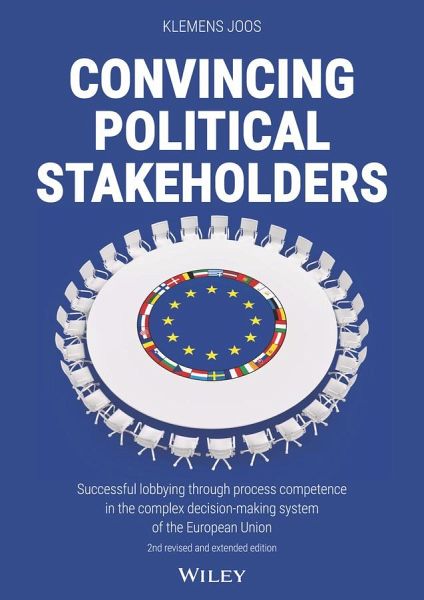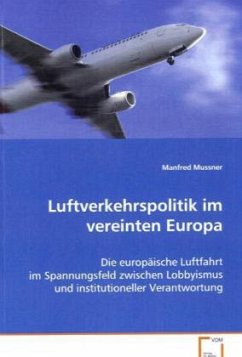
Convincing Political Stakeholders
Successful lobbying through process competence in the complex decision-making system of the European Union

PAYBACK Punkte
15 °P sammeln!
In the new edition of his standard work, the founder of one of the most successful lobbying companies in the European Union (EU), Prof. Klemens Joos, bundles experience acquired over more than three decades to form a scientific theory on governmental relations. It focusses on the insight that, in view of the increasingly complex decision-making structures of the EU, the most precise possible knowledge of decision-makers and decision-making processes is at least equally as important to success as the content aspects of interest representation. In a new chapter, the author sets out the formula f...
In the new edition of his standard work, the founder of one of the most successful lobbying companies in the European Union (EU), Prof. Klemens Joos, bundles experience acquired over more than three decades to form a scientific theory on governmental relations. It focusses on the insight that, in view of the increasingly complex decision-making structures of the EU, the most precise possible knowledge of decision-makers and decision-making processes is at least equally as important to success as the content aspects of interest representation. In a new chapter, the author sets out the formula for science-based interest representation developed by him from his practical experience.
With the Treaty of Lisbon, which entered into force on 1 December 2009, the EU de facto became a state territory stretching from Portugal to Finland and from Ireland to Cyprus. The European Parliament became an equal-status decision-maker alongside the Council of the European Union (Council). The previous co-decision procedure was elevated to become the standard procedure ("ordinary legislative procedure"). The so-called qualified majority (55 percent of the EU member states which simultaneously represent at least 65 percent of the EU population) was introduced for all important areas in the Council. As a result, the outcome of decision-making processes has become largely incalculable for the actors on the "European Union stage" - the EU member states, EU regions, companies, associations and organisations.
The second edition includes a new chapter, in which Prof. Klemens Joos makes the variables of successful interest representation even more tangible on the basis of his scientific formula: at the latest since the Treaty of Lisbon, the basic prerequisite for successful interest representation in the EU involves the continuous and close intermeshing of the affected party's content competence (of the four "classic instruments" of interest representation: corporate representative offices, associations, public affairs agencies, law firms) with process structure competence (i.e. the EU-wide maintenance of the required spatial, personnel and organisational capacities as well as strong networks across institutions, political groups and member states) on the part of an independent intermediary. The likelihood of success can be increased exponentially if success is achieved, firstly, in committing to the concern of an affected party through a change of perspective such that the positive effects on the common good are shifted into the foreground for the decision-makers in the EU (perspective change competence) and, secondly, in successfully integrating the concern into the crucial decision-making processes at the political level and continuously supporting it (process support competence).
Guest authors:
This work includes guest contributions from Prof. Christian Blümelhuber (Berlin University of the Arts), Prof. Anton Meyer (formerly LMU Munich), Prof. Armin Nassehi (LMU Munich) and Prof. Franz Waldenberger (Director of the German Institute of Japanese Studies, Tokyo) as well as a foreword by Prof. Gunther Friedl (Dean of the TUM School of Management) and a preface by Prof. Thomas F. Hofmann (President of TU Munich).
With the Treaty of Lisbon, which entered into force on 1 December 2009, the EU de facto became a state territory stretching from Portugal to Finland and from Ireland to Cyprus. The European Parliament became an equal-status decision-maker alongside the Council of the European Union (Council). The previous co-decision procedure was elevated to become the standard procedure ("ordinary legislative procedure"). The so-called qualified majority (55 percent of the EU member states which simultaneously represent at least 65 percent of the EU population) was introduced for all important areas in the Council. As a result, the outcome of decision-making processes has become largely incalculable for the actors on the "European Union stage" - the EU member states, EU regions, companies, associations and organisations.
The second edition includes a new chapter, in which Prof. Klemens Joos makes the variables of successful interest representation even more tangible on the basis of his scientific formula: at the latest since the Treaty of Lisbon, the basic prerequisite for successful interest representation in the EU involves the continuous and close intermeshing of the affected party's content competence (of the four "classic instruments" of interest representation: corporate representative offices, associations, public affairs agencies, law firms) with process structure competence (i.e. the EU-wide maintenance of the required spatial, personnel and organisational capacities as well as strong networks across institutions, political groups and member states) on the part of an independent intermediary. The likelihood of success can be increased exponentially if success is achieved, firstly, in committing to the concern of an affected party through a change of perspective such that the positive effects on the common good are shifted into the foreground for the decision-makers in the EU (perspective change competence) and, secondly, in successfully integrating the concern into the crucial decision-making processes at the political level and continuously supporting it (process support competence).
Guest authors:
This work includes guest contributions from Prof. Christian Blümelhuber (Berlin University of the Arts), Prof. Anton Meyer (formerly LMU Munich), Prof. Armin Nassehi (LMU Munich) and Prof. Franz Waldenberger (Director of the German Institute of Japanese Studies, Tokyo) as well as a foreword by Prof. Gunther Friedl (Dean of the TUM School of Management) and a preface by Prof. Thomas F. Hofmann (President of TU Munich).













